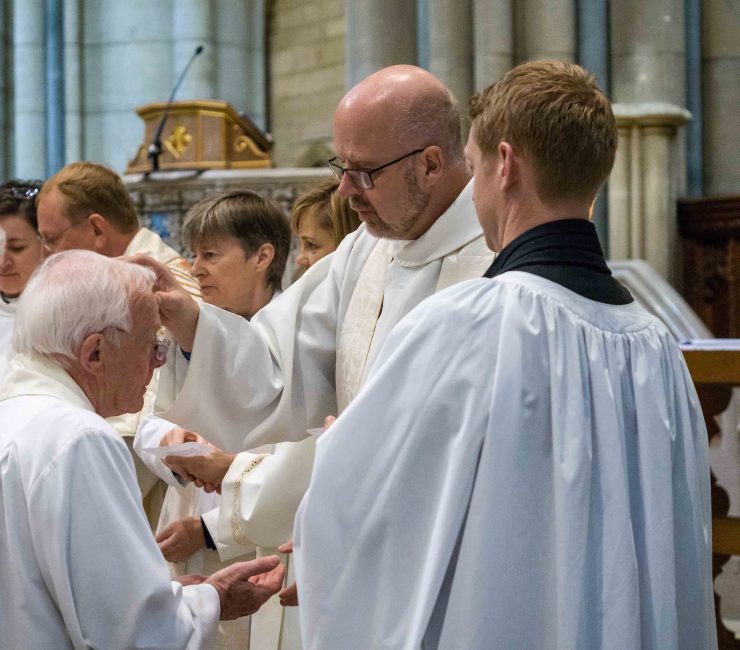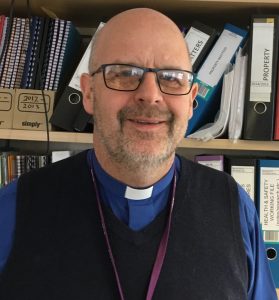From Archdeacon to the over-arching Transforming Mission

Archdeacon Bill Stuart-White at the Chrism Eucharist Service on Maundy Thursday
In 2006, when the Archdeacon of Cornwall, the Ven Bill Stuart-White, was a Rector in Camborne, he hit the national headlines not because he’d hitched up his robes and chased some teenagers down the street after they’d pinched a parishioner’s handbag, but because he caught them! The Lord is My Shepherd was playing, “It was quite appropriate,” said Bill, “As the last verse says, ‘Goodness and mercy all my life shall surely follow me.’”
It could be argued that Bill has continued the challenge of helping goodness and mercy to follow young people as he takes up his new role of heading up Transformation Mission in Falmouth. Except this time, the hope is he will be chasing them into and not out of church!
Bill the Archdeacon
Many know Bill as Bill the Archdeacon, affable, solid and wise. But who is he really and why has he taken the unusual step of rocking what could have been a relatively comfortable retirement boat?
Archdeacon Bill Stuart-White
“I’ve really enjoyed being an Archdeacon, overseeing the diverse parishes within the diocese and having the privilege of being involved in the big strategies as well as the nitty gritty of daily parish life. But my heart has always been in pastoral ministry, and I’ve missed that.”
On summer camp with future luminaries like the young Justin Welby
Bill was blessed as a teenager to go to Iwerne Minster, a Scripture Union summer camp set up by EGH Nash, affectionately known as Bash, with the sole purpose of growing Christian leaders. This meant that the young Bill found himself in the company of future visionaries and evangelists including Nicky Gumbel, who pioneered the Alpha course, John Mumford, who planted the Vineyard in the UK, and Justin Welby, the Archbishop of Canterbury.
“It was a wonderful place, a transforming time,” says Bill who, with two friends, started a school Christian Union that grew to around 100 members within a few years (from a pupil population of 500).
“It was normal to pray for and with friends, do Bible studies, see them become Christians and then move on to the next group. I look back and remind myself of what God can do.”
How it all began: “The call to be ordained was so clear, I looked up to see who was speaking”
Bill continued to let God transform him when deciding what to do with his life after studying classics at Oxford. “I was a Christian, I didn’t know what I should do, so I prayed. The answer that I should be ordained came so clearly that I looked up to see who was speaking!”
The answer may have been clear, but the pathway wasn’t always. “The vicar of my church in Oxford packed me off on Islington Week, an intensive experience for prospective ordinands, and I loved it. Then the DDO (Diocesan Director of Ordinands) took me on a walk around Worcester Cathedral gardens and decided I was the right sort of chap and so, so far so easy – thankfully discernment of Vocation is much more rigorous process nowadays!”
After three years theological training in Bristol, Bill’s first posting as Curate took him to Leeds where he spent a wonderful three years of curacy, experiencing the excitement of the “Signs and Wonders” ministry of John Wimber (not always with the approval of his training incumbent) followed by six months of planting a church on a housing estate – until the vicar moved on and he had to manage both churches. But the Heights Church plant survived and still flourishes today.
The frailty and broken of us all, including clergy
Bill moved on to a rural corner of Birmingham Diocese for his first incumbency before taking up the post of Rector in Camborne and the road ahead became a lot more challenging. “I had got married and ordained at almost exactly the same time and I think it’s true to say I became a better vicar than I did husband.”
“I had got married and ordained at almost exactly the same time and I think it’s true to say I became a better vicar than I did husband.”
The marriage broke down and it became a very public and painful time for the couple and their family. “It was also hard for the parish – it’s not what you expect from your vicar and lots of questions were asked, with some people finding it hard to come to terms with.”
Bill considered leaving the ministry but ultimately didn’t feel that was what God wanted him to do. “It has to be said, my preaching went up several notches. What people perhaps don’t realise is that when a vicar preaches, he is preaching firstly to himself – and I had a lot that I needed to say. I was frail, broken and it was messy. Exactly like everyone else, as I always had been, but now people knew it to be true.”
A lot changed for Bill after that. Lifelong assumptions and expectations had been trashed and he had to ask himself if he was twisting his theology to meet his changed circumstances, or had he learnt some stuff on the way that had changed his perspective.
“I like to think the latter,” says Bill. “When I met Bren, my second wife, I had been on my own for ten years and had no expectation that marrying again was a possibility. So I had big questions to wrestle with. But God is good and we are very happy, and I hope that I am a better husband and better minister because of it.”
Transforming Mission and Bill
“Transforming Mission is a big deal within our diocese, and is being watched by the Church of England at a national level. From its inception it has taken on its own momentum, or rather God’s momentum, with vision, funding and people seemingly falling into place at a pace quicker than the team could keep up.”
But then, recruiting for the role Pioneer Minister hit a wall. The last piece of the jigsaw, the rocket-fuel, the whatever-you-want-to call-it that would help propel the TM on the trajectory everyone believed God had planned for Falmouth and beyond.The response was bewildering in its silence.
After failing to appoint from good candidates at the first set of interviews, the second round of advertising drew barely any response. Everyone faithfully waited, fought against frustration and went back to the job-description drawing board. Until Bill woke up in the early hours with the unexpected and, as he says, slightly under-whelming, thought – “Why not me?” The thought grew, Bill prayed and took the thought to the team, none of whom said why not, but why didn’t we think of it earlier?!
Why not me?
Bill is a thoughtful, charismatic man with a passion for God and a heart for His people. He is a good leader, respected throughout the diocese and extremely well-placed to engender God’s love for the community of Falmouth in the hearts of its various congregations. Bill is preparing to join the people of All Saints Church, a lively congregation from a rather different tradition to his own, and though he is aware that this may prove an interesting challenge for all concerned, he is looking forward to learning as well as leading.
“Anglo-Catholic churches were often deliberately built in the heart of more deprived areas so that they could reach the impoverished,” says Bill. “That’s how many of the traditions came about, like the different liturgical colours and the visual drama of the services, because they would be better understood by people who couldn’t read. I think we sometimes forget why we do things, the fact that they were created to build bridges, not barriers.”
Bill says he knows less about his faith now than he did forty years ago, but that doesn’t mean his faith is less solid. The closer we get to God, the more He reveals and the less we understand. But Bill is certain of one thing, that going back to “frontline” ministry feels like the right thing.
“My desire to go back to parish ministry is to say that it’s good news! Being church should be joyful. I do sense that there’s rather a lot of anxiety around in church at the moment and my prayer is that all concerned with All Saints, and with Transforming Mission in Falmouth, should enjoy the journey we’re embarking on. It may prove to be tough, but let’s get right to the heart of our faith and try to live it. I don’t find it easy, just like the next person, but with TM we have a real opportunity to be a positive witness as we seek to live the Gospel together and find ways to attract the missing generations. It’s just a really exciting opportunity.”
No one, surely, can argue with that.






